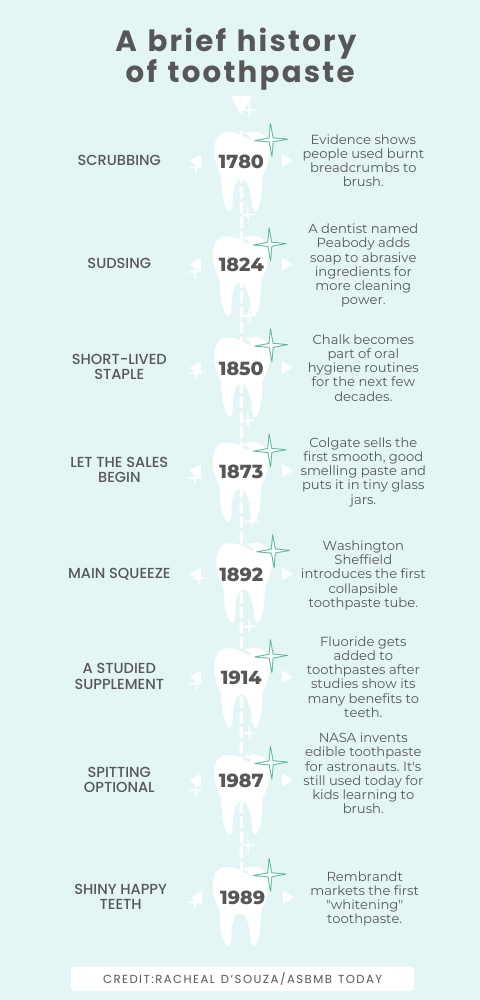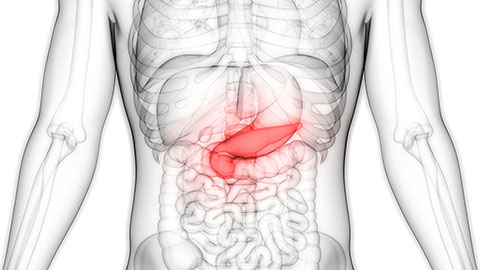Tooth decay and beyond
Starting when we are little, we are taught that good breath, strong teeth and clean gums are all important parts of oral health, and that's certainly true. But oral health is much more than just clean teeth. While most people are aware of common dental problems such as cavities, halitosis and gum disease, fewer know that simply brushing your teeth two times a day can also help you avoid more serious problems, such as Alzheimer’s disease, pancreatic cancer, cardiovascular diseases and birth complications. The mouth is indeed a window into the rest of your body!
October is National Dental Hygiene Month to promote not only a healthy mouth but also a healthy lifestyle.

Drilling down on the biochemistry of tooth decay
During the formation of teeth, inorganic (mineral) material and organic (polymer) structures both play major roles. Mineralization is the process by which inorganic calcium and phosphate are deposited on the organic matrix. The natural microbiota of the oral cavity maintain a normal physiological balance with the host to maintain health. However, when this balance is disrupted, that can trigger disease.
Dental caries, known to most as tooth decay or just plain cavities, are caused by demineralization that leads to destruction of a tooth. Tooth decay is a dynamic process involving deposition of a biofilm on the tooth surface that undergoes several metabolic reactions, resulting in a chemical dissolution of tooth material. Having a sugar-rich diet can promote accumulation of acidogenic bacteria such as Streptococcus mutans, leading to acid damage and demineralization of the tooth enamel. S.mutans are responsible for bacterial fermentation of residual food, which forms dextran and causes a sticky plaque.
Alzheimer’s disease
Researchers are increasingly interested in understanding the relationship between the mouth, the gut and the brain.
The mouth is home to about 700 species of bacteria, including those that can cause periodontal (gum) disease such as gingivitis. A recent analysis led by scientists at the National Institute on Aging suggests that bacteria that cause gum disease are also associated with the development of Alzheimer’s disease and other related dementias. A study from 2018 in the Journal of Oral microbiology also linked bacteria causing gingivitis and Alzheimer’s. A species of bacteria called Porphyromonas gingivalis can travel from infections in the mouth through the bloodstream to the brain. Once in the brain, the bacteria release enzymes called gingipains that can destroy nerve cells, which in turn can lead to memory loss and eventually Alzheimer's.
This is an active area of inquiry, with new studies coming out all the time. As Edina Silajdžić at King’s College London said earlier this year upon presenting her work on the gut–brain connection at the Alzheimer’s Research UK 2022 Conference: "Most people are surprised that their gut bacteria could have any bearing on the health of their brain, but the evidence is mounting, and we are building an understanding of how this comes about. Our gut bacteria can influence the level of inflammation in our bodies, and we know that inflammation is a key contributor to Alzheimer’s disease.”
Pancreatic cancer
Scientists are also interested in the role of mouth bacteria in pancreatic cancer, a disease that often escapes early diagnosis and causes 40,000 U.S. deaths annually.

A 2019 study by researchers at the NYU Langone cancer center found that the presence of certain bacteria in the mouth may reveal increased risk for pancreatic cancer. Pancreatic cancer patients are known to be susceptible to gum disease, cavities and poor oral health in general, and that vulnerability led the research team to search for direct links between the makeup of bacteria driving oral disease and subsequent development of pancreatic cancer. “Our study offers the first direct evidence that specific changes in the microbial mix in the mouth — the oral microbiome — represent a likely risk factor for pancreatic cancer along with older age, male gender, smoking, African-American race, and a family history of the disease,” senior investigator and epidemiologist Jiyoung Ahn said.
Certain populations are at higher risk of pancreatic cancer. In 2019, researchers at Boston University explored the relationship between oral health and the risk of pancreatic cancer in Black women. They wrote: "The present analysis, based on data from a large sample of African American women, indicates that, relative to women who showed no signs of poor oral health, those who reported adult tooth loss had a substantially increased risk of pancreatic cancer. The association was stronger for loss of at least five teeth and was observed primarily among nonsmokers, who have a lower baseline risk of pancreatic cancer."
Cardiovascular disease
Periodontitis is associated with an increased risk of developing heart disease.
Although the connection is not fully understood yet, research over the years has suggested that heart disease, clogged arteries and stroke are linked to the inflammation and infections that oral bacteria can cause. Also, poor dental health increases the risk of a bacterial infection in the bloodstream, leading to inflammation of and damage to blood vessels, which can affect the heart valves.
Researchers at the University of Bristol have been pursuing studies of mouth bacteria for many years. A team led by Howard Jenkinson back in 2010 presented work at the Society for General Microbiology meeting showing that plaque-causing bacteria can jailbreak from the mouth into the bloodstream and increase your risk of heart attack.
Streptococcus bacteria commonly live in the mouth, confined within communities termed biofilms and are responsible for causing tooth plaque and gum disease. The Bristol researchers, in collaboration with scientists at the Royal College of Surgeons in Ireland, showed that, once let loose in the bloodstream, Streptococcus can use a protein on their surface, called PadA, as a weapon to force platelets in the blood to bind together and form clots.
"People need to be aware that as well keeping a check on their diet, blood pressure, cholesterol and fitness levels, they also need to maintain good dental hygiene to minimise their risk of heart problems," Jenkinson said at the time.

Pregnancy and birth complications
Pregnant people have plenty to worry about, and oral health is on that list.
According to the Centers for Disease Control and Prevention, at least 60% of pregnant people are affected by gingivitis, an early stage of periodontal disease that occurs when the gums become red and swollen. If gingivitis is not treated, tooth loss is possible. It's believe that mouth infections may be aggravated by changing hormones during pregnancy.
Periodontitis, meanwhile, is a serious infection that has been known for quite some time to be associated with poor pregnancy outcomes, including premature birth and low birth weight. However, how periodontitis may lead to adverse pregnancy outcomes is not yet fully understood.
The bacteria that cause inflammation in the gums can actually get into the bloodstream and target the fetus. One reasonable mechanism begins with deleterious effects of endotoxins released from Gram-negative bacteria responsible for periodontal disease. Hence, periodontal disease appears to be an independent risk factor for premature labor and low-birth-weight babies.
Author's note: The connection between bacteria from your oral microflora and more serious ailments is something that takes most people by a surprise. Having said that, not all tooth decays put you at risk of absolutely falling prey to the diseases mentioned above.
Enjoy reading ASBMB Today?
Become a member to receive the print edition four times a year and the digital edition monthly.
Learn moreGet the latest from ASBMB Today
Enter your email address, and we’ll send you a weekly email with recent articles, interviews and more.
Latest in Science
Science highlights or most popular articles

Key regulator of cholesterol protects against Alzheimer’s disease
A new study identifies oxysterol-binding protein-related protein 6 as a central controller of brain cholesterol balance, with protective effects against Alzheimer’s-related neurodegeneration.

From humble beginnings to unlocking lysosomal secrets
Monther Abu–Remaileh will receive the ASBMB’s 2026 Walter A. Shaw Young Investigator Award in Lipid Research at the ASBMB Annual Meeting, March 7-10 in Washington, D.C.

Chemistry meets biology to thwart parasites
Margaret Phillips will receive the Alice and C. C. Wang Award in Molecular Parasitology at the ASBMB Annual Meeting, March 7-10 in Washington, D.C.

ASBMB announces 2026 JBC/Tabor awardees
The seven awardees are first authors of outstanding papers published in 2025 in the Journal of Biological Chemistry.

Missing lipid shrinks heart and lowers exercise capacity
Researchers uncovered the essential role of PLAAT1 in maintaining heart cardiolipin, mitochondrial function and energy metabolism, linking this enzyme to exercise capacity and potential cardiovascular disease pathways.

Decoding how bacteria flip host’s molecular switches
Kim Orth will receive the Earl and Thressa Stadtman Distinguished Scientists Award at the ASBMB Annual Meeting, March 7–10, just outside of Washington, D.C.

